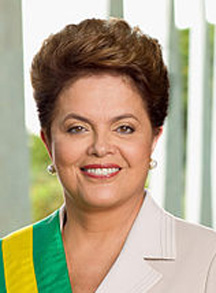BRASILIA, (Reuters) – Some forty years ago, Dilma Rousseff was a guerrilla fighter working clandestinely to bring a version of Cuban leader Fidel Castro’s communist revolution to Brazil.

How times change. When Rousseff makes her first visit to Cuba next week as Brazil’s president, she’ll have capitalism on her mind, specifically the building of a container terminal at the port of Mariel aimed at future trade with the United States when Washington one day lifts its 50-year-old embargo on Cuba.
The $800 million modernization of the natural harbor west of Havana is being done by Brazilian engineering firm Odebrecht with funding from Brazil’s state development bank BNDES. It is part of a vast and growing constellation of Brazilian-run projects in Latin America, Africa and elsewhere that has paralleled Brazil’s recent rise as an economic power.
The business-focused nature of Rousseff’s Cuba trip highlights a shift in Brazil’s foreign policy since she took office early last year, with trade trumping all other considerations.
Her predecessor Luiz Inacio Lula da Silva valued commercial ties too but also sought more overtly political relations with controversial leaders such as Iran’s Mahmoud Ahmadinejad – whom Rousseff has all but ignored since taking office.
Rousseff’s interest in business ventures abroad has been heightened by the global slowdown that brought the booming economy of Latin America’s largest nation to a halt in the third quarter of 2011, forcing her to focus on restoring growth.
Her first major trip abroad after taking office in January 2011 was to China, which dislodged the United States as Brazil’s top trading partner in 2009.
Rousseff’s advisers say that her focus in Cuba will be on economic cooperation but that she has also asked to meet with Castro, who inspired a generation of left-wing Latin Americans.
Rousseff was a committed leftist who joined an armed group to fight military dictatorship in Brazil in the late 1960s. She was arrested in 1970, tortured and imprisoned for three years.
After democracy was restored in 1985, Rousseff evolved into a pragmatic, left-leaning politician. A year ago she became Brazil’s first woman president, running an economy that has relied on foreign investment and smart financial management to lift tens of millions of Brazilians out of poverty — thus accomplishing one of the dreams of her socialist youth.
SYMPATHY FOR CUBA
Rousseff’s trip means she will visit Havana before she goes to Washington – a decision that has raised some eyebrows given Brazil’s recent confrontations with the United States over trade and other issues.
Advisers play down any symbolism, and note that Rousseff is due to visit President Barack Obama in Washington early this year, though no date has been decided.
“We have good relations with the United States, even though we have differences in international affairs,” said Rousseff’s foreign policy adviser Marco Aurelio Garcia.
Brazil is offering Cuba sugar-cane ethanol technology and $200 million in credit for small private farmers to acquire tractors and harvesting and irrigation equipment.
Garcia said sympathy for Cuba in its David-versus-Goliath Cold War era feud with the United States runs deep in Brazil and other Latin American nations that reject the U.S. trade embargo on the Caribbean island.
Brazilian sources say the government would like to see a democratic opening in Cuba and is closely watching economic reforms adopted by President Raul Castro, but that it will not push hard.
Garcia said political reform was up to the Cubans. “We will not tell them what to do.”




